Claudio Carere is adjunct professor in the Department of Ecological and Biological Sciences, University of Tuscia, Italy. Dario Maestripieri is professor of comparative human development, evolutionary biology, and neurobiology at the University of Chicago.
The University of Chicago Press, Chicago 60637
The University of Chicago Press, Ltd., London
2013 by The University of Chicago
All rights reserved. Published 2013.
Printed in the United States of America
22 21 20 19 18 17 16 15 14 13 1 2 3 4 5
ISBN-13: 978-0-226-92205-8 (cloth)
ISBN-13: 978-0-226-92197-6 (paper)
ISBN-13: 978-0-226-92206-5 (e-book)
ISBN-10: 0-226-92205-7 (cloth)
ISBN-10: 0-226-92197-2 (paper)
ISBN-10: 0-226-92206-5 (e-book)
Library of Congress Cataloging-in-Publication Data
Animal personalities: Behavior, physiology, and evolution / edited by Claudio Carere and Dario Maestripieri.
pages. cm.
Includes bibliographical references and index.
ISBN-13: 978-0-226-92205-8 (cloth: alk. paper)
ISBN-10: 0-226-92205-7 (cloth: alk. paper)
ISBN-13: 978-0-226-92197-6 (paper)
ISBN-10: 0-226-92197-2 (paper)
ISBN-13: 978-0-226-92206-5 (e-book)
ISBN-10: 0-226-92206-5 (e-book)
1. Animal behavior. I. Carere, Claudio. II. Maestripieri, Dario.
QL751.A667 2013
591.5dc23
2012022902
 This paper meets the requirements of ANSI/NISO Z39.481992
This paper meets the requirements of ANSI/NISO Z39.481992
(Permanence of Paper).
ANIMAL PERSONALITIES
Behavior, Physiology, and Evolution
EDITED BY
CLAUDIO CARERE AND DARIO MAESTRIPIERI
THE UNIVERSITY OF CHICAGO PRESS
Chicago and London
Contents
Claudio Carere, Dario Maestripieri
Jennifer A. Mather, David M. Logue
Alison M. Bell, Susan A. Foster, Matthew Wund
Kees van Oers, Marc Naguib
Alexander Weiss, Mark J. Adams
Samuel D. Gosling, Pranjal H. Mehta
Kees van Oers, David L. Sinn
Niels J. Dingemanse, Denis Rale
Andrew Sih
Max Wolf, G. Sander van Doorn, Olof Leimar, Franz J. Weissing
James P. Curley, Igor Branchi
Ton G. G. Groothuis, Dario Maestripieri
Doretta Caramaschi, Claudio Carere, Andrea Sgoifo, Jaap M. Koolhaas
Brian R. Smith, Daniel T. Blumstein
Felicity Huntingford, Flavia Mesquita, Sunil Kadri
Sonia A. Cavigelli, Kerry C. Michael, Christina M. Ragan
Contributors
Mark J. Adams, Department of Animal and Plant Sciences, University of Sheffield, Sheffield SIO 2TN, UK,
Alison M. Bell, School of Integrative Biology, University of Illinois Urbana-Champaign, Urbana, IL 61801, USA,
Daniel T. Blumstein, Department of Ecology and Evolutionary Biology, University of California Los Angeles, Los Angeles, CA 90095, USA,
Igor Branchi, Section of Behavioural Neurosciences, Dipartimento di Biologia Cellulare e Neuroscienze, Istituto Superiore di Sanit, 00161 Roma, Italy,
Doretta Caramaschi, Research Unit on Childrens Psychosocial Maladjustment, Research Centre, Sainte-Justine Hospital, Montreal H3T 1C5, Quebec, Canada,
Claudio Carere, Ichthyogenic Experimental Marine Center (CISMAR), Department of Ecological and Biological Sciences, Universit degli Studi della Tuscia, Borgo Le Saline, 01016 Tarquinia, Italy,
Sonia A. Cavigelli, Department of Biobehavioral Health, Penn State University, University Park, PA 16802, USA,
James P. Curley, Department of Psychology, Columbia University, New York, NY 10027, USA,
Niels J. Dingemanse, Department of Behavioral Ecology and Evolutionary Genetics, Max Planck Institute for Ornithology, Seewiesen, Germany,
G. Sander van Doorn, Department of Behavioral Ecology, Institute of Ecology and Evolution, University of Bern, Hinterkappelen, CH-3032, Switzerland,
Susan A. Foster, Department of Biology, Clark University, Worcester, MA 01610, USA,
Samuel D. Gosling, Department of Psychology, The University of Texas at Austin, Austin, TX 78712, USA,
Ton G. G. Groothuis, Department of Behavioural Biology, University of Groningen, 9750 AA Haren, The Netherlands,
Felicity Huntingford, Ecology and Evolutionary Biology Group, Faculty of Biomedical and Life Sciences, University of Glasgow, Glasgow G12 8QQ, UK,
Sunil Kadri, Ecology and Evolutionary Biology Group, Faculty of Biomedical and Life Sciences, University of Glasgow, Glasgow G12 8QQ, UK,
Jaap M. Koolhaas, Department of Behavioral Physiology, University of Groningen, 9750 AA Haren, The Netherlands,
Olof Leimar, Department of Zoology, Stockholm University, Stockholm, SE-106 91, Sweden,
David Logue, Department of Biology, University of Puerto Rico at Mayagez, Mayagez, PR 00681, USA,
Dario Maestripieri, Department of Comparative Human Development, The University of Chicago, Chicago, IL 60637, USA,
Jennifer A. Mather, Department of Biological Sciences, University of Lethbridge, Lethbridge, Alberta T1K 3M4, Canada,
Pranjal H. Mehta, Department of Psychology, University of Oregon, Eugene, OR 97403, USA,
Flavia Mesquita, Ecology and Evolutionary Biology Group, Faculty of Biomedical and Life Sciences, University of Glasgow, Glasgow G12 8QQ, UK,
Kerry C. Michael, Department of Psychiatry, University of Maryland School of Medicine, Baltimore, MD 21201, USA,
Marc Naguib, Netherlands Institute of Ecology, NL-6666 ZG Heteren, The Netherlands,
Kees van Oers, Netherlands Institute of Ecology, NL-6666 ZG Heteren, The Netherlands,
Christina M. Ragan, Department of Psychology, Michigan State University, East Lansing, MI 48824, USA,
Denis Rale, Dpartement des Sciences Biologiques, Universit du Qubec Montral, Montral, Qubec H3C 3P8, Canada,
Andrea Sgoifo, Department of Evolutionary and Functional Biology, University of Parma, Parma, 43100, Italy,
Andrew Sih, Department of Environmental Science and Policy, University of California at Davis, Davis, CA 95618, USA,
David L. Sinn, School of Zoology, University of Australia, Hobart, Tasmania, Australia,
Brian R. Smith, Department of Ecology and Evolutionary Biology, University of California Los Angeles, Los Angeles, CA 90095, USA,
Alexander Weiss, Department of Psychology, School of Philosophy, Psychology and Language Sciences, The University of Edinburgh, Edinburgh EH8 9JZ, UK,
Franz J. Weissing, Theoretical Biology Group, Centre for Ecological and Evolutionary Studies, University of Groningen, 9751 NN Haren, The Netherlands,
Max Wolf, Department of Biology and Ecology of Fishes, Leibniz-Institute of Freshwater Ecology and Inland Fisheries, 12587 Berlin, Germany,
Matthew Wund, Department of Biology, The College of New Jersey, Ewing, NJ 08628, USA,
Introduction
Animal Personalities: Who Cares and Why?
CLAUDIO CARERE, DARIO MAESTRIPIERI
Everyone who has experienced close, long-term relationships with animals, such as pet owners or farmers, probably believes that domesticated animals show personality variation, the way people do. In fact, there are studies suggesting that pets personalities appear to match those of their owners (Gosling 2001). It is possible that pet owners project their own personalities onto their pets, or expect that their pets will complement some aspects of their own personalities (Gosling et al. 2003). In this view, animal personalities would be a product of pet owners imagination and social-emotional needs. It turns out, however, that personalities are not observed or suspected only in domesticated animals. They have been scientifically demonstrated in nondomesticated animals as wellfrom invertebrates to monkeys and apesand in a variety of different environments. In fact, the study of animal personality is one of the fastest growing areas of research in behavioral biology and behavioral ecology.
Next page
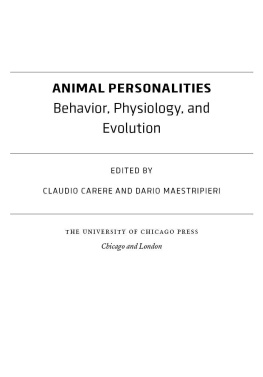
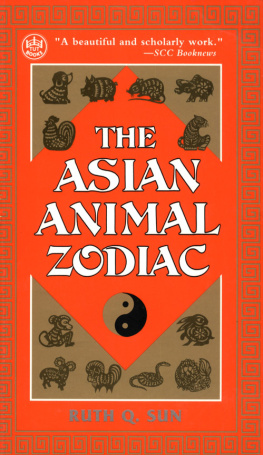
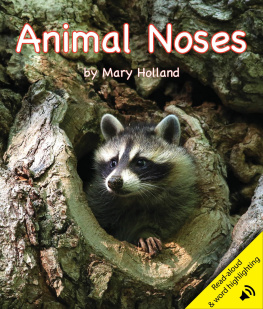
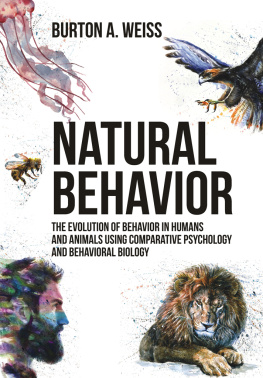
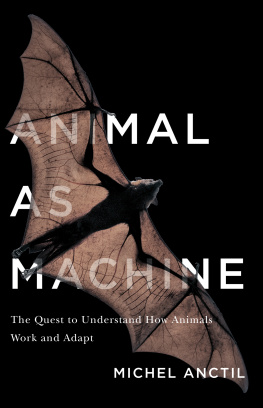

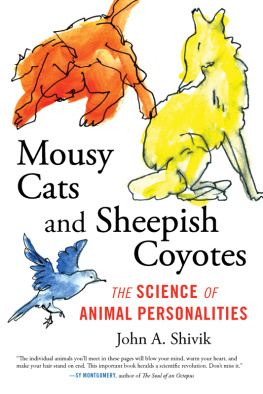


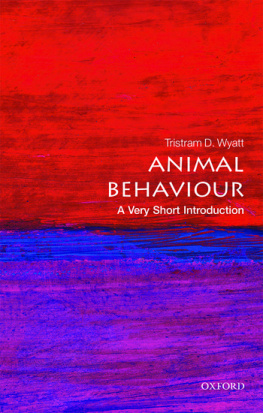
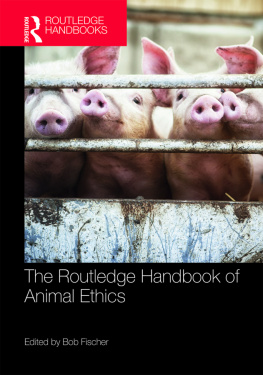
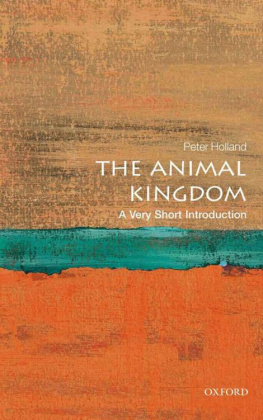
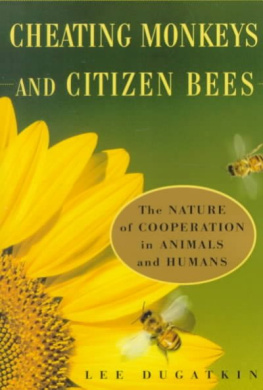
 This paper meets the requirements of ANSI/NISO Z39.481992
This paper meets the requirements of ANSI/NISO Z39.481992